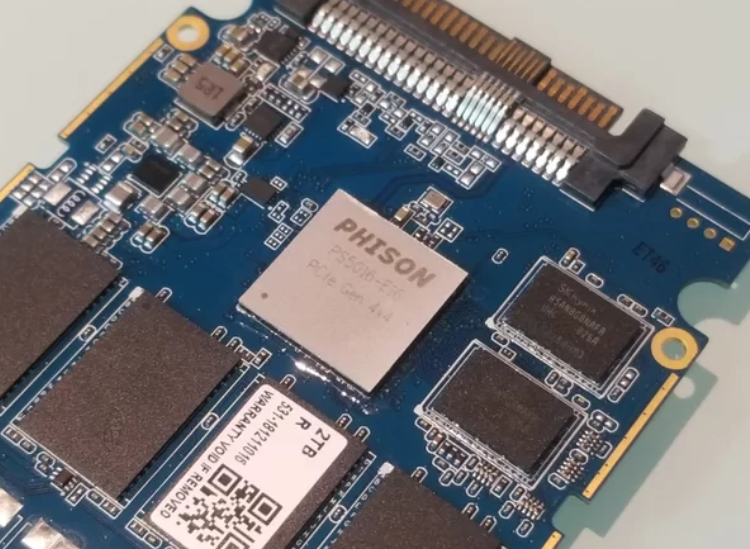Gigabyte's Aorus PCIe 4.0 SSD, Under the Hood at 5GB/s
Gigabyte has touched off the PCIe 4.0 SSD race with a tweet of a shadowy picture of its new M.2 Aorus NVMe Gen4 SSD, but that's just the beginning of the PCIe 4.0 SSD arms race. As the name implies, this new SSD is designed for a PCIe 4.0 connection, meaning that you'll need a Ryzen 3000-equipped system to unlock the full 5GB/s of throughput.
Gigabyte hasn't elaborated on 4K random performance, but given what we know about the SSD controller that is likely hiding under the hood, we can expect random performance to land in the 900,000 IOPS range for both reads and writes. There's also the possibility of capacities of 512GB, 1TB, and 2TB. That means Gigabytes Aorus SSD will be the fastest M.2 on the planet when it comes to market, but there are also even faster PCIe 4 SSDs coming next year.
The picture in Gigabyte's tweet shows a copper-looking heatsink over the drive, which would make sense for an enthusiast-oriented SSD, and deducing the components underneath isn't too hard. Because Gigabyte doesn't make its own SSD controllers, it has three possible third-party controller companies to choose from: SMI, Phison, or Link_A_Media. Of the three, and only one has a working PCIe 4.0-compliant SSD that is production-ready: Phison.
Phison actually demoed its new E16 controller, the world's first PCIe 4.0 SSD controller, for us at CES 2019 back in January. At the time Phison was still developing the E16 controller and had it paired with Micron's flash. That combination put out 4 GB/s of read throughput and 4.2 GB/s of write speed, but Phison told us those numbers would improve when Toshiba's BiCS4 flash became available. Given the 5GB/s spec for the Aorus SSD, it's likely we'll see BiCS4 on the SSD when it comes to market.
| Phison PCIe 4.0 E16 Refernce Designs | 500GB | 1TB | 2TB |
| Die | 16 | 32 | 32 |
| Capacity Per Die | 256Gbit | 512Gbit | 512Gbit |
Gigabyte hasn't announced specifications for 4K random performance, but Phison told us at CES that the controller can hit up to 900,000 random read and write IOPS. Gigabyte also hasn't announced which capacities the SSDs will come in, but we know that Phison's reference design library, which most vendors base their SSDs on, includes 500GB, 1TB, and 2TB models. The 500GB model has lower write performance due to only coming with 16 flash die, while the 1TB and 2TB models come equipped with 32 die for the maximum performance in both read and write workloads.
Phison has beaten other SSD controller vendors to market by using its existing E12 controller engine paired with its own PCIe 4.0 PHY. That combination doesn't entirely saturate the PCIe 4.0 bus that boasts theoretical throughput of up to 8GB/s, but the E16 is just Phison's mid-range SSD controller. The company has a new high-end E19 controller coming in the Q1-Q2 2020 timeframe that will push the limits of the PCIe 4.0 x4 interface.
Phison is also switching from TSMC's 28nm process to TSMC's 12nm for the E19. The smaller process will boost performance and also help the company reduce power consumption, as the PCIe 4.0 bus is power hungry: The E16 pulls a maximum of 8W under load. The higher power consumption of PCIe 4.0 SSDs could slow adoption in mobile devices, but Phison is also bringing a lower-tier DRAMless SSD controller for M.2 2230 SSDs to market by the end of the year. The smaller manufacturing process, coupled with the lack of a DRAM chip, will help the company meet the stricter power requirements for laptops.
Get Tom's Hardware's best news and in-depth reviews, straight to your inbox.
We expect to learn more details, such as pricing, capacities, and availability, here at Computex.

Paul Alcorn is the Editor-in-Chief for Tom's Hardware US. He also writes news and reviews on CPUs, storage, and enterprise hardware.
-
bit_user Reply
The table seems wrong. Going from 500 GB to 1 TB, you'd double either the chip capacity or chip count, but not both.PaulAlcorn said:(table) -
NightHawkRMX For general gamers or pc users, i think even a sata 3 ssd is enough.Reply
But for workstations this could be great. -
Rdslw Reply
We talked same thing about HDD's few years ago.remixislandmusic said:For general gamers or pc users, i think even a sata 3 ssd is enough.
But for workstations this could be great.
m.2 with 3/1 GB/s is already same price as sata, so you go for slower when we don't have to ? its better than sata on side & speed, cheaper to make as its smaller (raw materials).
soon you will forget about sata, and that 5 GB/s is next sweet upgrade we as mortals will get in ~2/4 years.

